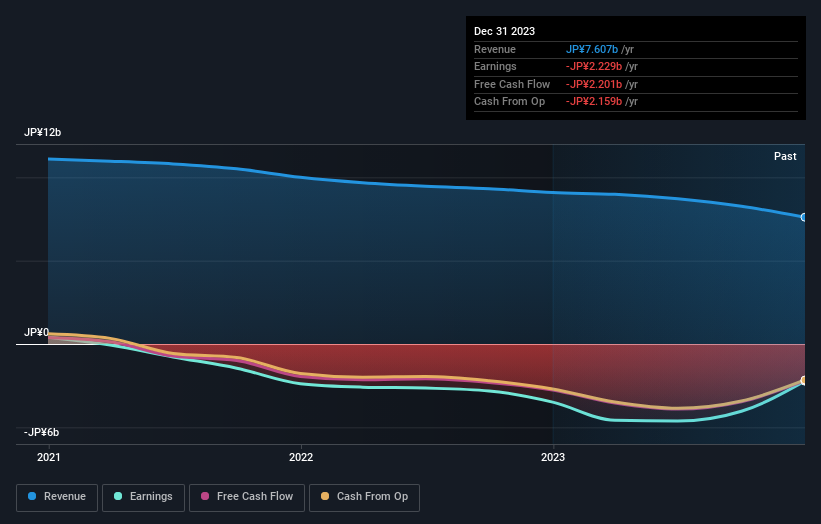Stock Analysis
- Japan
- /
- Interactive Media and Services
- /
- TSE:2193
Cookpad (TSE:2193 shareholders incur further losses as stock declines 11% this week, taking three-year losses to 49%

Cookpad Inc. (TSE:2193) shareholders should be happy to see the share price up 28% in the last quarter. But that cannot eclipse the less-than-impressive returns over the last three years. In fact, the share price is down 49% in the last three years, falling well short of the market return.
With the stock having lost 11% in the past week, it's worth taking a look at business performance and seeing if there's any red flags.
See our latest analysis for Cookpad
Because Cookpad made a loss in the last twelve months, we think the market is probably more focussed on revenue and revenue growth, at least for now. Shareholders of unprofitable companies usually desire strong revenue growth. That's because fast revenue growth can be easily extrapolated to forecast profits, often of considerable size.
Over the last three years, Cookpad's revenue dropped 11% per year. That is not a good result. The annual decline of 14% per year in that period has clearly disappointed holders. That makes sense given the lack of either profits or revenue growth. Of course, sentiment could become too negative, and the company may actually be making progress to profitability.
The graphic below depicts how earnings and revenue have changed over time (unveil the exact values by clicking on the image).

If you are thinking of buying or selling Cookpad stock, you should check out this FREE detailed report on its balance sheet.
A Different Perspective
While the broader market gained around 31% in the last year, Cookpad shareholders lost 19%. Even the share prices of good stocks drop sometimes, but we want to see improvements in the fundamental metrics of a business, before getting too interested. Regrettably, last year's performance caps off a bad run, with the shareholders facing a total loss of 7% per year over five years. Generally speaking long term share price weakness can be a bad sign, though contrarian investors might want to research the stock in hope of a turnaround. It's always interesting to track share price performance over the longer term. But to understand Cookpad better, we need to consider many other factors. Consider for instance, the ever-present spectre of investment risk. We've identified 3 warning signs with Cookpad (at least 2 which don't sit too well with us) , and understanding them should be part of your investment process.
We will like Cookpad better if we see some big insider buys. While we wait, check out this free list of growing companies with considerable, recent, insider buying.
Please note, the market returns quoted in this article reflect the market weighted average returns of stocks that currently trade on Japanese exchanges.
Valuation is complex, but we're helping make it simple.
Find out whether Cookpad is potentially over or undervalued by checking out our comprehensive analysis, which includes fair value estimates, risks and warnings, dividends, insider transactions and financial health.
View the Free AnalysisHave feedback on this article? Concerned about the content? Get in touch with us directly. Alternatively, email editorial-team (at) simplywallst.com.
This article by Simply Wall St is general in nature. We provide commentary based on historical data and analyst forecasts only using an unbiased methodology and our articles are not intended to be financial advice. It does not constitute a recommendation to buy or sell any stock, and does not take account of your objectives, or your financial situation. We aim to bring you long-term focused analysis driven by fundamental data. Note that our analysis may not factor in the latest price-sensitive company announcements or qualitative material. Simply Wall St has no position in any stocks mentioned.
About TSE:2193
Flawless balance sheet and overvalued.


